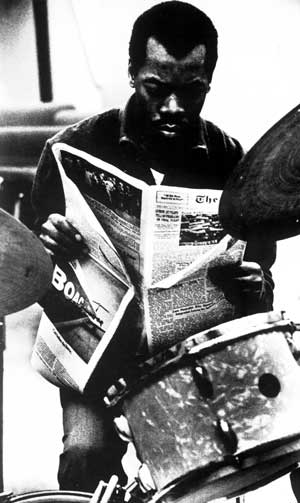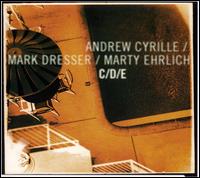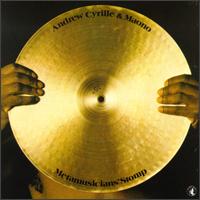

Courtesy of Andrew Cyrille

Music Magnet Media

Black Saint
A FIRESIDE
CHAT WITH ANDREW CYRILLE
I have a couple of records of Andrew Cyrille, one on Black Saint (one
of my favorite labels), Metamusicians' Stomp and other on Soul Note (the
sister label), Good to Go: A Tribute to Bu, that are superb. Metamusicians'
Stomp features David S. Ware and Good to Go is a collaboration with James
Newton. So if anything, the drummer certainly knows who to play with.
And that kind of common sense is good enough for me. Thus, the Weekly
roadshow is honored to have Mr. Andrew Cyrille as our guest, as always,
unedited and in his own words.
FRED JUNG: Let's start from the beginning.
ANDREW CYRILLE: I started on the instrument in a drum bugle corps when
I was in grade school in Brooklyn. There were some older people who had
been in the corps some years before and one of the guys decided to come
and resuscitate it and he asked some of the students who were in the sixth,
seventh, eighth grade if they wanted to partake. I was one of them that
decided to volunteer and that was the beginning of the journey.
FJ: When did it go from casual pastime to profession?
ANDREW CYRILLE: I probably started when I was about fourteen, fifteen
years old. That was with of course other young musicians who lived in
Brooklyn and wanted to learn and play the music, so we used to play at
parties and dances and now and then, we would get a concert somewhere.
One of the musicians who became very, very prominent over the years was
Eric Gale. He died a few years ago, but he and I went to the same high
school and we used to eat lunch together and we would talk about trying
to form a group, but we needed a piano player so we could have a trio.
From there, we started meeting older musicians who were playing and giving
us pointers about the music and the business.
FJ: You grew up during the heyday of bebop.
ANDREW CYRILLE: Bebop was the dominant thinking apparatus at that time
and that is the new creative force anyway. It was just on everybody's
mind. I remember reading musicians like Hank Mobley and Kenny Dorham.
We would be playing the music of George Shearing. You are trying to learn
these things and after learning some of them and playing them fairly well,
or at least to a reasonable facsimile of the people who composed them.
That was what was being learned and that was in everybody's mind at that
time, bebop. Of course, swing was there too because I heard musicians
like Gene Krupa and I had heard Lester Young and Coleman Hawkins on the
radio when I was a kid.
FJ: All that must have seemed tame to you when you met Cecil Taylor.
ANDREW CYRILLE: (Laughing) Well, you know, Fred, Cecil came out of the
bebop situation also. A lot of people might not realize it, but he's a
very well schooled musician, so of course, he knows quite a bit about
bebop also. He just played it differently from some of the other people.
For example, if you listen to some of those records that he made with
Coltrane and Kenny Dorham, there are a lot of standard tunes that he played
and then he had groups with Ted Curson and Bill Barron. They played tunes
by Billy Strayhorn. When I met Cecil, he had at that time, decided to
begin to try some other things as far as rhythm and note groupings were
concerned. So to say that it was common, no, I wouldn't say that, but
it was something that was challenging to me. When I met Cecil, we had
a very good relationship and it was very congenial. From there, we continued
to see each other on the scene for a few years and it came to pass that
he asked me to work in his unit.
FJ: Did you find the initial reception for the music was less than lukewarm?
ANDREW CYRILLE: Well, yeah, to a lot of people, it was not only lukewarm,
but down right hostile and also, some people wouldn't even consider it
as being in the genre or parallel to any jazz. So sometimes it was lukewarm
to say the least. But at the same time, there were also people who were
ecstatic about the music and who loved it. There was not too much in between.
I would it was either one or the other.
FJ: What sparked such controversy?
ANDREW CYRILLE: Well, you can play in two different ways. You can play
from a prescription of changes and meter. Let's say you are playing just
a regular blues. You are going to have a certain number of chords that
are applied to certain bars in the 12-bar format that is done with a repetitive
format. What most bebop musicians do is they make melodies on those changes.
Now, with somebody like Cecil, what happens is that you might play a group
of chords for a certain period of time or you might you might submit notes
from a certain register of the piano and then there is no meter. Usually
what happens is that you begin a phrase and you follow it to its natural
conclusion. So within those two given techniques, you can improvise, which
means you compose, organize, perform what hear in the moment. That is
the same thing that you do when you car playing changes, it is just that
the concept is different.
FJ: Your thoughts on David S. Ware.
ANDREW CYRILLE: He is a giant. He is a giant.
FJ: Muhal Richard Abrams.
ANDREW CYRILLE: A great composer and arranger.
FJ: Oliver Lake.
ANDREW CYRILLE: A thinker on the alto saxophone.
FJ: Borah Bergman.
ANDREW CYRILLE: Borah lives in his left hand (laughing).
FJ: As a drummer, is your approach to playing free different from that
of bebop?
ANDREW CYRILLE: Oh, definitely, there is a difference. There is a difference,
number one, in how you think about making the music, the approach that
you use. It really just comes down to very basically, how you want to
make the music. What you do with it is another thing.
FJ: So what defines free jazz?
ANDREW CYRILLE: Number one, the intention and the other thing is not necessarily
playing on changes and for the most part, it is extended form. Each of
us has a rhythm and a certain kind of cadence in how we talk and with
the sound that comes out and so, very often, I like to think of free jazz
as being like that. You listen and you apply what you do alongside or
in conjunction to whatever else is happening. Usually that is how improvisation
is done.
FJ: You must be one hell of a listener.
ANDREW CYRILLE: Yeah, that is a major part of what we have to do. Usually
in the context of Western music, drums usually emphasize melodic parts.
You can modulate what you play on the drums to give some semblance of
pitch variation. But at the same time too, I'm not necessarily playing
some rhythmical lines by some other voice. Usually the rhythm that the
drums play, in conjunction with the rhythm that the bass player plays,
that is in conjunction with what the piano player plays, all of those
rhythms, sometimes layered on each other are parts of a musical bed or
rhythmical bed, especially with the drums because the bass and the piano
bring in other aspects of harmony. With drums on the bottom, you're giving
feeling. You are giving almost skeletal construction to the rest of the
body of the music.
FJ: What defines a metamusician?
ANDREW CYRILLE: (Laughing) You must be thinking about one of those tunes
I wrote years ago. Well, you know, Fred, it is like a figure of speech
that I invented in my own head. I just put metamusicians. I said we are
more than musicians in terms of doing this piece.
FJ: With the exception of Art Blakey, no other drummer has recorded prolifically
as a leader.
ANDREW CYRILLE: Well, that has to do with the business and it has to do
with the culture of Western music. We have a very large European heritage
that formed us and makes us who we are in the society as well as the African
culture. For the most part, drums emphasize what the other voices do.
You think of a percussion section in a symphony orchestra and they usually
emphasize certain things that go on. They support, very often, the things
that go on with the other voices, the violins and the trumpets, the piano,
or the ensemble. We learn to listen from another point of view. I am not
saying that it is bad, it is just that sometimes, it can be discriminating
in so far as leadership. If you come from an African society, you have
a very definitive drum society. Very often, it is the first instrumentation
or the first voice that you hear. In a country like we have, where business
is very, important, in terms of buying and selling and so what you usually
have are not necessarily drummers as leaders to sell the product of music.
You have piano players. You have trumpet players.
FJ: Is Western culture afraid of the drums?
ANDREW CYRILLE: Well, it is what's in people's minds, Fred. Look at the
symphony orchestra. Where is the percussion section? The percussion section
is not in front. It is way in the back. They might tell you that it is
way in the back because the sound of the drums would impede on the sounds
of the violin. That might be, but I think at the same time, drummers can
be sophisticated enough to play at a dynamic level where the other instruments
can be heard. I think there is a psychological thing that goes with that
that says that drummers are supposed to be in the back. There used to
be a time that everybody in the band would play solos and it would be
time for the drummer to play a solo and people would get up and start
going to the bathroom or it would be time to get drinks because what the
drummer was playing was not necessarily music, but noise. As a result,
they would not give a drummer as much respect as they would a piano player
or singer or saxophone or trumpet player. Now, some of those things are
changing. Just to make a point about free music. Free music brought the
drummer out front more. A lot of times when I would be playing with Cecil,
everybody would be soloing, so that made it parallel or equivalent to
a lot of the other instrumentations. Me, being a drummer, that put the
weight on me to make sure that I was playing good music as good as I could
in relationship to whatever was going on around me.
FJ: So free jazz has been good to the drummer?
ANDREW CYRILLE: I think so. Without a doubt. It opened us up and it opened
up the concept and allowed me to play on different parts of the instrument.
FJ: And the future?
ANDREW CYRILLE: The next thing that I have is in Michigan, which I will
be performing with a trio that I have which includes Oliver Lake and Reggie
Workman on bass. In August, I will be doing something a little more creative.
I have put together an ensemble, at first, it will be a duet between me
and the drummer, Billy Hart and on each succeeding night, there is going
to be four nights, we will have a different saxophone player. The first
night, we will have Gary Bartz. The second night will be Dave Liebman.
The third night will be David S. Ware and the fourth night will be Joe
Lovano. This will take place at the Knitting Factory in New York.
FJ: At the conclusion of your career, what would kind of legacy would
you like to leave behind?
ANDREW CYRILLE: As a musician who wanted to make a contribution to the
language of jazz and make a contribution to American culture, to the black
experience, and the black experience is the sum total of all of our experiences.
I've had a great live up until now and I hope it continues for as long
as possible with being involved with some of the greatest minds in music.
Music has given me a real significant feeling for living life and I've
learned so much by just being part of the music itself. It is something
that I look forward to doing on a daily basis and I will continue to look
forward to doing as long as I have the opportunity to continue to play.
FJ: Sounds like it has been a wonderful life thus far.
ANDREW CYRILLE: It has been a good life, Fred. I'm not rich monetarily,
but I am rich spiritually.
Fred
Jung is Jazz Weekly's Editor-In-Chief and has donated a litter box to
Bill Clinton. Comments? Email
Fred.